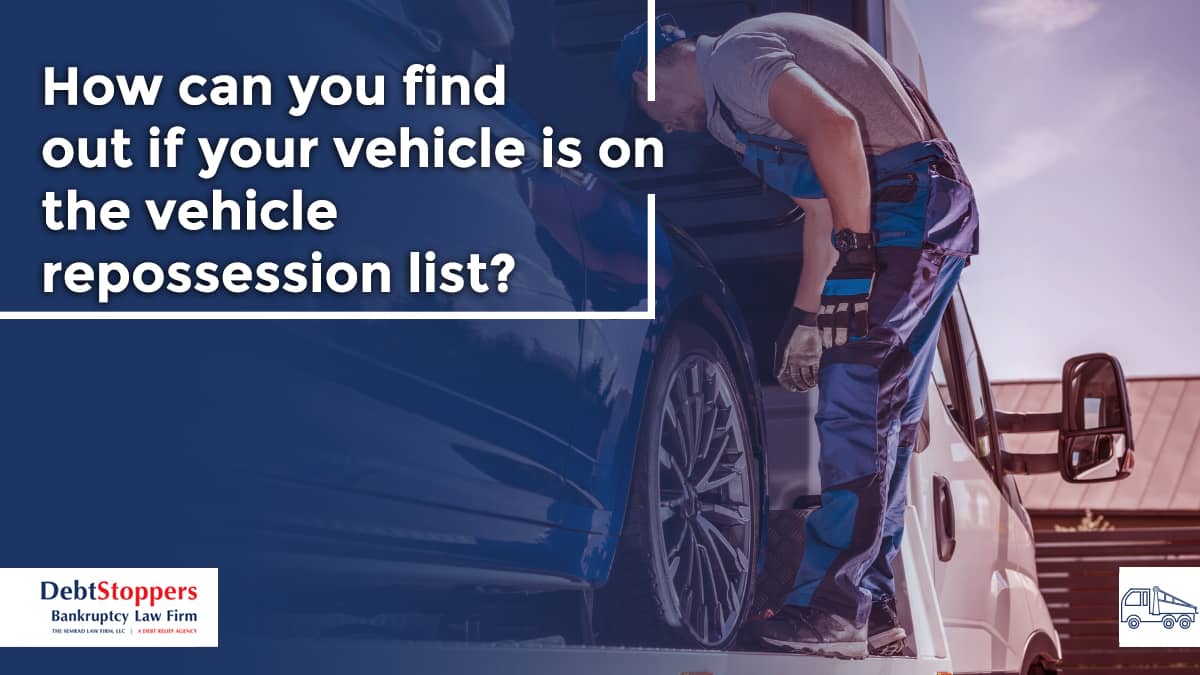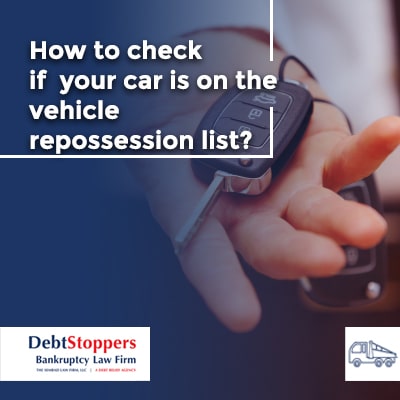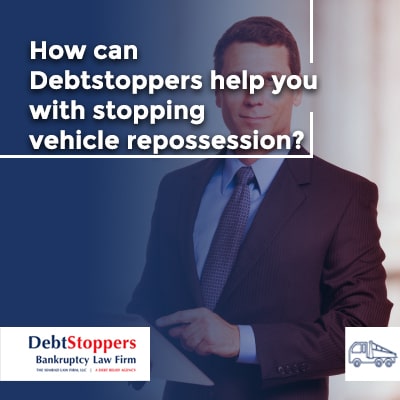How can you find out if your vehicle is on the vehicle repossession
Updated on 16 July 2025

If you’re worried that your vehicle is on the repossession list there are several proactive steps you can take. This guide will tell you what you need to know.
Overview of vehicle repossession
Before repossession, the lender may send a notice of default or demand payment. However, in many states, they are not legally required to notify you before repossessing the vehicle.
Once you default on your loan, the lender has the legal right to repossess the vehicle without a court order. They can do this as long as they do not breach the peace, which means they cannot use physical force, threats, or enter your home or garage without permission.
Lenders typically hire a repossession agent or tow truck company to locate and seize the vehicle. Some states allow a redemption period where you can pay off the loan balance or cure the default to get your vehicle back. This may involve paying the full loan balance plus fees.
If the lender sells the vehicle after repossession and the sale doesn’t cover the remaining loan balance, you may be responsible for paying the deficiency balance. The deficiency balance is the difference between the sale price and what you owe on the loan. For example, if the vehicle is sold for $20,000 but you still owe $25,000, you would be responsible for paying a deficiency balance of $5,000.
If you anticipate difficulty making payments, it’s crucial to communicate with your lender. They may be willing to work out a payment plan, defer payments, or modify the loan terms. Refinancing the loan to lower your payments can be an option if you qualify. Or if you’re in severe financial distress, exploring options like debt settlement, credit counseling, or bankruptcy might help you avoid repossession.
Filing for bankruptcy will stop the repossession process due to the automatic stay that halts all collection activities. Or if you know you cannot continue making payments, voluntarily surrendering the vehicle may reduce some fees and show that you were proactive, though it still impacts your credit. If you allow the lender to take the vehicle without trying to negotiate or surrender it, this is usually viewed more negatively on your credit report.
Take Control Before It's Taken From You
Voluntarily surrendering your car can reduce stress, avoid surprise repossessions, and limit extra fees.
Speak to an Attorney Now

Understanding the repossession process and your rights can help you avoid repossession or mitigate its impact on your financial situation.
What is vehicle repossession?
Vehicle repossession occurs when a lender or leasing company takes back a vehicle from the borrower or lessee due to non-payment or a breach of the loan or lease agreement.
What are the most common reasons for vehicle repossession?
The most common reason for vehicle repossession is failing to make timely payments on an auto loan or lease, known as a breach of contract. Another common reason for repossession is failing to maintain the required insurance.
How to Know Who Repossessed My Car?
If your car was repossessed, you can call the dealership or your lender to find out if they initiated a repossession. If they did, they should be able to tell you who the repo agent is.
If that doesn’t work or you are unsure who your lender is off the top of your head, you can also call the non-emergency line for the local police department, since they are usually notified when a car is repossessed to prevent any confusion if the car is later reported stolen.
Loan agreements can vary greatly, and so do repossession laws at the local and state levels. It’s important to review your loan agreement to ensure you understand the terms of your loan and make sure your rights have not been violated.
"How Do I Know if My Car Was Repossessed?" - One of the Most Frequently Asked Questions
If you walk out of work and your car is missing, you may be wondering if your car was repossessed or possibly stolen. If you find yourself in this situation, you may want to contact an experienced attorney who can help answer your questions, ensure you understand your options, and protect your rights.
DebtStoppers has helped thousands of people who are facing a repossession and need help knowing if their car was repossessed and what they can do next.
In some cases, borrowers may voluntarily return the vehicle to avoid the repossession process, though this still impacts credit and may involve additional fees.
How can you avoid ending up on a vehicle repossession list?
If you are falling behind on car payments, you need to act quickly because you may already be at risk of repossession. Depending on the state and the terms of the loans, vehicles can be repossessed after missing just one payment.
There are several steps you can take to avoid ending up on a vehicle repossession list. First, it’s important to act quickly. As soon as you realize you are struggling to make a payment, contact your lender and ask if they offer payment deferrals, forbearance, or modified payment plans.
Make sure that you do not skip a car payment without a plan. Missing even one or two payments increases your risk of ending up on a vehicle repossession list. Additionally, some loans have no grace period, so it’s important to understand when a payment is considered late by your lender.
If you are facing a more serious financial situation or your lender is not willing to work with you, speaking with a debt relief attorney can provide options to protect your vehicle.

How to check if your car is on the vehicle repossession list?
If you're concerned that your car might be on the vehicle repossession list due to missed payments or other issues, here is what you need to know.
Review your loan agreement
First, review your loan or lease agreement to understand the specific terms regarding default and repossession. This will give you a better idea of when repossession might occur. If you've missed payments, you may be at risk of repossession.
Check for missed payments
If you are worried that you are at risk of repossession, you can review your payment history to see if you are behind on any payments.
Contact your lender
The most direct way to find out if your car is at risk of repossession is to contact your lender or leasing company. Ask if your account is in good standing or if repossession proceedings have begun. If you're behind on payments, your lender may be willing to work out a payment plan or offer a temporary solution to avoid repossession.
Check online repossession listings
Lenders are often required to send a notice of default or demand payment before they initiate repossession. Check your mail and email for any communication from your lender. In some states, lenders must send you a notice after the vehicle has been repossessed, informing you of your rights and the steps you can take to recover the vehicle.
Seek legal help
If you are unsure about the status of your vehicle or if you believe your rights are being violated, you should schedule a consultation with a consumer rights attorney. Attorneys experienced in repossession can help you understand your situation and what steps to take.
Can a repossession be reversed after your car is listed?
Yes, in many cases, a repossession can be reversed. If your vehicle has only been listed for repossession but hasn’t been picked up, you may still have time to prevent the repossession from occurring. If the vehicle has already been repossessed, you do have options.
Depending on your loan agreement and state laws, you may have the option to reinstate your loan by catching up on missed payments and covering any associated fees. In other situations, you may be able to redeem the vehicle by paying off the loan in full before it’s sold at auction.
However, it’s important to understand that these options are typically only available for a short amount of time, often just a few days or weeks. Some states also offer legal protections that require the lender to notify you before selling the vehicle, giving you time to act. If you are unsure of your rights or the terms of your loan, speaking with an experienced attorney can help you understand your options and possibly reverse the repossession process before it is final.
If your car gets repossessed do you still owe on it?
Yes, in many cases, you may still owe money on your car loan even after repossession. This is because of a deficiency balance, which is the difference between what you owe on the loan and the amount the lender recovered from selling your vehicle.
Once your car is repossessed, the lender usually sells it at an auction or through a private sale. If the sale price does not cover the remaining balance on your loan, you are responsible for paying the deficiency balance. For example, if you owed $15,000 on your car loan and the lender sold your vehicle for $10,000, you would still owe $5,000 plus any additional fees or charges.
If you do not pay the deficiency balance, the lender may attempt to collect the money from you. This can include collection calls, letters, or even legal action. If they sue you and obtain a court judgment, they may be able to garnish your wages or seize other assets.
It’s important to know that filing for Chapter 7 bankruptcy can eliminate a deficiency balance, meaning you would no longer be legally responsible for paying it. If you file for Chapter 13 bankruptcy, the balance may be included in a structured repayment plan, making it more manageable. Consulting with a bankruptcy attorney can help you determine the best course of action.
How soon does a repo show on your credit?
A car repossession can appear on your credit report within 30 to 60 days after the lender takes possession of the vehicle.
However, the damage can be long-lasting and make it more difficult to obtain new credit or loans.
First, it’s important to know that a repossession can lower your credit score by 100 points or more, which can make it more difficult to qualify for loans, credit cards, and rental agreements.
A repossession remains on your credit report for up to seven years, even if you later pay off the deficiency balance. In addition to the repossession itself, your credit report will also reflect the late or missed payments that proceeded the repossession, further lowering your score.
It’s also important to know that if you are struggling with debt and are at risk of repossession, filing for bankruptcy can help. A Chapter 13 bankruptcy places an automatic stay on repossession, giving you time to catch up on missed payments and keep your vehicle. If repossession has already occurred, Chapter 7 bankruptcy can help eliminate any remaining deficiency balance, allowing you to move forward financially.
Explore Your Options Before You Give Up
Voluntary repossession isn’t your only choice — talk to our legal team about refinancing, selling, or other solutions.
Get a Free Consultation

What is vehicle redemption?
Vehicle redemption is a legal option that allows you to reclaim your repossessed car by paying off the full loan balance in a lump sum. This differs from loan reinstatement, which only requires you to pay the overdue amounts and fees to continue making monthly payments.
Simply put, you must pay the full remaining loan balance in a lump sum, not just the overdue payments. If you can make the payment before the vehicle is sold at auction, the lender is legally required to return your car. The timeframe for redemption varies by state, but typically, you have only a few weeks to act before the car is permanently sold.
If paying a lump sum is not an option, Chapter 13 bankruptcyChapter 13 bankruptcy allows you to restructure your debt and make payments over time. In some cases, Chapter 7 bankruptcy may allow you to redeem the vehicle for its fair market value, which can be beneficial if you owe more than the car is worth.

How can Debtstoppers help you with stopping vehicle repossession?
The experienced repossession attorneys at Debstoppers can help you stop vehicle repossession or mitigate its effects.
First, an attorney can negotiate with your lender to modify the terms of your loan, such as lowering the interest rate, extending the loan term, or temporarily reducing or deferring payments. They can help you negotiate a payment plan that works for your financial situation, allowing you to catch up on missed payments and avoid repossession.
In some cases, an attorney can work with the lender to reinstate the loan by arranging for you to pay the past due amount in a lump sum or over a short period.
If the repossession process involved a breach of peace an attorney can argue that the repossession was unlawful and seek to have the vehicle returned.
Additionally, an attorney can help you understand if bankruptcy would help your situation. If so, an attorney can file for bankruptcy, which triggers an automatic stay meaning that all collection activities including repossession are stopped.
Our team of attorneys can help you understand your rights under state law, including any redemption periods or right-to-cure provisions that might allow you to stop the repossession by paying off or catching up on your loan. After repossession, if the car is sold for less than the balance owed, you could be responsible for the difference and an attorney can help reduce or eliminate the money you owe.
If repossession seems inevitable, an attorney can help you negotiate a voluntary surrender of the vehicle, which may reduce some of the fees and damage to your credit score compared to involuntary repossession. Our attorneys can also work to minimize the consequences of the surrender, such as negotiating the terms of the deficiency balance or helping you understand the impact on your credit.
The experienced attorneys at Debtstoppers can help you dispute excessive repossession fees, storage charges, and other costs imposed by the lender, ensuring that any amounts you are asked to pay are fair and legally justified. By working with Debtstopers, you can explore all available options to stop or mitigate vehicle repossession, protect your rights, and manage the financial fallout effectively.







